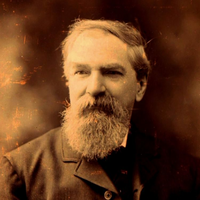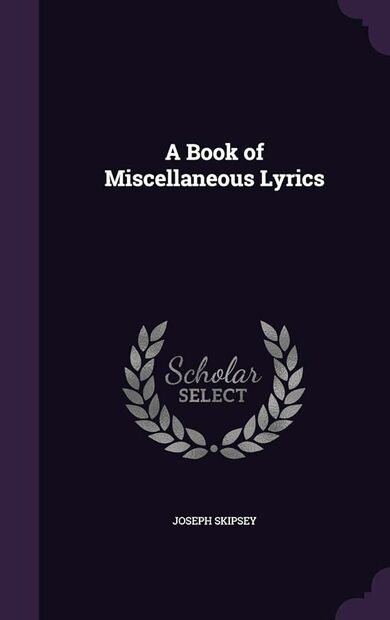Arachne
I READ in an old book the myth
Of the Hellenian damsel with
The magic needle, when there fell
On me a power—a mystic spell—
I could not well to others tell.
But all at once my soul was swept
Into a sphere where sorrow kept
Her vigils sad. There on my ear
Awoke in accents deep, yet clear,
What might in my weak English to
A sympathetic ear thus flow:—
“The guerdon of my heavy sin
Forever thus I toil and spin
The fatal cord, the lash accursed,
By which my heavy woo is nursed.”
“From whence this wail?” I inly asked,
When thro’ the gloom I saw unmasked
One, from whose thin wan face and look,
I for the needle-worker took;
And lifting up my voice I said:—
“And art thou she of whom I’ve read—
Arachne’s self? No answer made
The image pale, nor turned, nor fled,
Nor into air, thin air dissolved:
But while within my thoughts revolved,
A something on my vision loom’d;
Tho’ what it was might be presumed
Not clearly seen, at least by one,
Still bound to earth by flesh and bone;
But whatsoe’er it was or meant,
Anon thereon her gaze was bent;
And this way that, her white hands went,
Whilst to their motion keeping time,
Re-woke upon my ear the chime,
Which might in my weak English to
A sympathetic ear thus flow:—
”The guerdon of my ebon sin,
Forever thus I toil and spin,
The fatal cord, the lash accursed,
By which my heavy woe is nursed.
“The sun and moon, they come and go,
The ocean’s waters ebb and flow;
My baleful star must ever burn,
My swollen tide know no return.
”Woe, woe the day, woe, woe the day
I first did feel that piercing ray,
Beneath whose magic touch, behold,
The rock’s converted into gold.
“Ah, from that hour did earth become
To me a glad, a jewell’d home;
Where-e’er I turned enrapt I viewed,
A living fact the fair and good.
”Where-e’er I turned enrapt I viewed,
A living fact the fair and good,
Which to my spirit’s chambers sped,
And with the inner beauty wed.
“As casquets in which gems are shrined,
So from the lustre of my mind,
My body borrowed splendour, till
My presence stood a living will.
”Entranced I took the web and wrought
A vision so with beauty fraught,
The gazer held his breath and crept
Into himself, and smiled and wept.
“Delusive tears, delusive smiles,
What were you but the serpent’s toils?—
The nectar sparkling in yon cup,
To writhe the lips that quaff it up?
”Flushed with success I then did cast,
A scornful glance upon the past;
And from that moment I began,
A course which ended in this ban.
“The very God within me burns;
My soul a mortal triumph spurns;
Not mortals, o’er immortals must
I stride, or perish in the dust.
”Thus frantically cried I, when
Was flashed upon my inner ken
Minerva’s might and sheen, and I,—
What was there left me but to die?
“A meteor in the night, her might
And sheen is flashed upon my sight;
But as the night by meteor cleft,
My soul again in gloom is left.
”I view the den in which I crawl,
I view what doth my soul appal;
But ah, ere I my plight can mend,
All hope to me hath found an end.
“And now instead of sylvan ground,
Where grief was lost, where joy was found;
My path is such each step I take,
Awakes the hissing of the snake.
”My night is still by horrors throng’d,
My day is but that 'night prolong’d;
The sun may set, the sun may rise,
No soothing slumber seals my eyes.
“Around, beneath, and over-head,
The finger of the Livine Dread
Has fix’d a curse which see—What’s this
Would thus o’er-brim my heart with bliss?
”Yes, yes my hand that vision traced,
Mine ivory brow with wreaths are graced;
Aloud my pean’s sung, aloud,
And she my rival’s head down bowed.
“No, never since the world begun,
Was ever such a triumph won
By mortal or immortal—nay—
I’ve brook’d the worst an earth-born may.—
”The sun and moon they come and go,
The ocean’s waters ebb and flow,
My baleful star must ever burn,
My swollen tide know no return.
“And, such the guerdon of my sin
Thus, thus to toil, and thus to spin
The fatal cord, the lash accursed,
By which my heavy woe is nursed.”
Thus mourned the damsel; while she mourn’d,
Back into sense my soul return’d;
At which receded from my ken
The needle-worker’s image, when
I wept heart-rent, and felt distrest,
Till thro’ the chaos in my breast
Did break a light by which I saw,
That thro’ the working of a law
Inwoven with our being, we
Can never brook but should be—
Can never brook, have never borne,
But what is for our weal eterne:
That furthermore this maid of old,
Tho’ cast in a diviner mould,
Lack’d that by which we only can
—A knowledge of the inner man—
Become by wisdom blest, and so,
In the deep shades of Long Ago,
Erred as to her own gifts—their reach—
Erred as to what all gifts should teach;
How much to Him—the All in All—
In whom we live and move, and shall;
How much to Him—to me or you,
How very small the credit due
For any gift we vaunt. In this,
Arachne her way did miss,
And so incurred what all incur,
Who in life’s mystic maze thus err—
The doom her errors to deplore;
The doom should tear the veil aside,
Did from herself her failings hide,
And gift her with the needed light
By which to know herself aright;
The doom should show to her how vain
And weak is man, and must remain
Compared with gods who eras long,
Have scanned the lines of right and wrong;
The doom by which she in the end,
Would to the Inner Circle wend,
Where crowned with bliss, with glory crown’d,
A nobler labour should be found
To claim her cure than that which claim’d,
When she in Greece with pride was named;
And when the best were foremost found,
To honour her whose genius framed,
What their own triumphs shamed.


